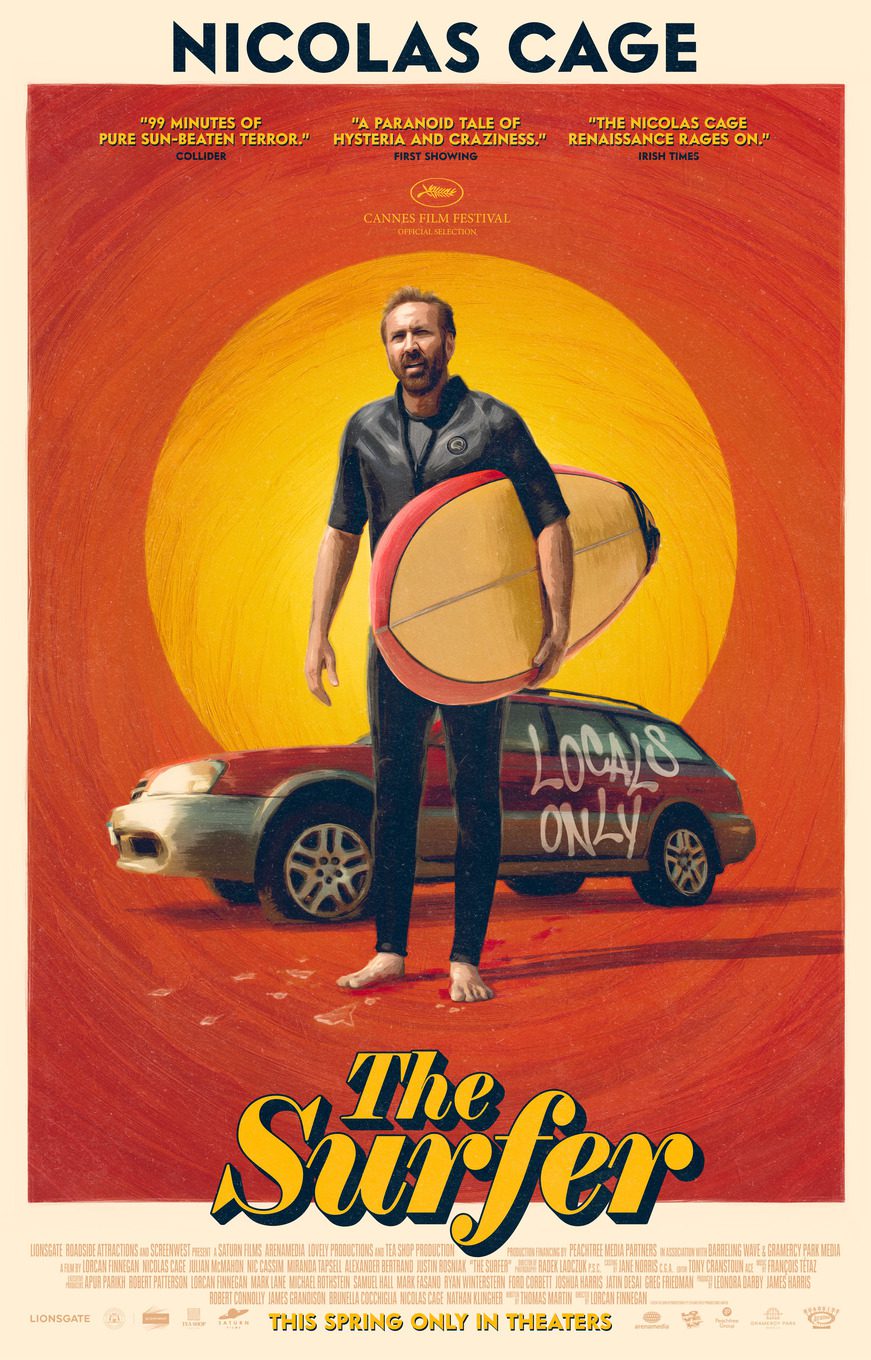
Catching the Wave: An Introduction to The Surfer
Director Lorcan Finnegan, known for his unsettling explorations of confinement and societal pressure in films like Vivarium, returns with The Surfer. This time, he swaps suburban uncanny for coastal dread. Written by Thomas Martin, the film presents a deceptively simple premise: a man, seeking nostalgic solace, returns to the idyllic beach of his youth intending to share the waves with his son. However, this sun-bleached homecoming rapidly devolves into a tense, increasingly bizarre territorial dispute.
Starring the inimitable Nicolas Cage, The Surfer is a visceral plunge into the deep end of psychological breakdown, fueled by tribalism, wounded pride, and a particularly potent crisis of masculinity. It’s a challenging, often shocking ride that earns high praise, largely thanks to its magnetic lead and Finnegan’s commitment to its escalating nightmare logic.
Table of Contents

Riding into Conflict: The Premise of The Surfer
Cage plays the titular, unnamed Surfer, a man seemingly trying to reconnect with his past and his teenage son (Finn Little). Returning to a stunning Australian beach that holds deep personal significance, his plan is simple: catch some waves, bond with his boy, and perhaps recapture a glimmer of his own lost youth. The beauty of the location, however, masks an undercurrent of fierce localism.
Almost immediately, the Surfer encounters a menacing group of territorial beach dwellers, led by the implicitly threatening Scally (Julian McMahon) and his crew (including Alexander Bertrand). They inform him, in no uncertain terms, that he doesn’t belong there, that this specific stretch of sand is theirs. Humiliated in front of his son, the Surfer refuses to back down.
What begins as a stubborn assertion of his right to be there spirals into an obsessive contest of wills. Denied access to the waves, he sets up camp in the parking lot, a defiant act that becomes the flashpoint for a sustained campaign of psychological warfare, pushing him further and further towards an existential edge he may never paddle back from.
Nicolas Cage Unleashed: A Masterclass in Cinematic Meltdown
Let’s be clear: a significant portion of The Surfer‘s magnetic pull comes directly from Nicolas Cage’s central performance. Over the years, Cage has carved a unique niche, capable of subtle dramatic work but arguably most electrifying when allowed to operate at the frayed edges of human sanity. Here, Finnegan unleashes him. As the Surfer becomes increasingly desperate, isolated, and stripped of his dignity by the relentless locals, his composure cracks, shatters, and then explodes.
It is often said that an unhinged Nic Cage is the best Nic Cage, and this film provides ample evidence for that claim. He charts the character’s descent from bewildered exasperation to simmering resentment, then to obsessive fixation, and finally into something primal and terrifying. It’s not just shouting and wild eyes, though there is some of that; it’s the physical transformation, the paranoia creeping into his posture, the raw vulnerability warring with wounded pride. Cage makes the Surfer’s unraveling feel both horrifyingly inevitable and strangely understandable within the film’s heightened reality. It’s another memorably unhinged performance that anchors the film’s surreal journey.

Beneath the Surface: Exploring Masculinity and Tribalism
Beyond the central conflict, The Surfer digs its surfboard fins deep into thematic territory. The film functions as a potent, if sometimes blunt, examination of toxic masculinity and territoriality. The local surfers represent an aggressive, exclusionary tribe, guarding their domain with an almost feral intensity. Their rejection of the Surfer isn’t just about waves; it’s about perceived intrusion, about defending a fragile sense of ownership and identity tied to place.
The Surfer’s refusal to leave becomes less about surfing and more about reclaiming his perceived manhood after the initial humiliation. His escalating actions, driven by pride and a refusal to be emasculated, mirror the very toxicity he confronts. The characters, particularly the locals, can sometimes blur together into a monolithic force of antagonism, creating a waking nightmare fueled by these destructive impulses. The film presents a crisis of masculinity where communication breaks down entirely, replaced by posturing, intimidation, and ultimately, a descent into near savagery.
Sun, Sand, and Surrealism: Lorcan Finnegan’s Vision
Lorcan Finnegan crafts a distinct and unsettling atmosphere. He juxtaposes the breathtaking natural beauty of the coastline, all golden sands and turquoise waters, with the ugliness of the human conflict unfolding upon it. The visuals become increasingly gnarly and visceral as the Surfer’s ordeal intensifies. Finnegan employs mind-bending twists and jarring sequences that contribute to the film’s dreamlike, or rather nightmarish, quality.
The narrative doesn’t always follow conventional logic, instead leaning into the Surfer’s deteriorating mental state. There’s a palpable influence from B movies and Ozploitation cinema, a rawness and a willingness to embrace the strange and shocking. The film feels caught somewhere between its reverence for these genre pictures and its ambition to offer commentary on family, home, belonging, and the aforementioned themes of masculinity. This blend creates a unique, if sometimes jarring, viewing experience.

Wiping Out or Riding High? Assessing The Surfer’s Impact
The Surfer succeeds brilliantly as a showcase for Nicolas Cage and as a generator of sustained, uncomfortable tension. Its commitment to its increasingly outlandish premise is admirable, pulling the audience along on the Surfer’s downward spiral. The shocking visuals and unsettling tone linger long after the credits roll. However, the film isn’t without its minor imperfections. While its thematic concerns are clear, the critique of social conditions sometimes feels more like a primal scream than a finely tuned argument, which, arguably, might be the point.
Its B-movie leanings and surreal detours may alienate viewers seeking straightforward narrative coherence. The supporting characters, particularly the antagonists, function more as symbolic obstacles than fully fleshed-out individuals, reinforcing the feeling that we are trapped within the Surfer’s subjective, fracturing perspective. Despite these points, the film’s raw energy and Cage’s captivating performance make it a compelling watch. It captures a specific kind of modern anxiety, a feeling of displacement, and the volatile consequences of wounded pride.
The Final Wave: Is The Surfer Worth Watching?
Ultimately, The Surfer is a strange, potent, and often brilliant film. It’s a fever dream set on a beautiful beach, a character study of a man pushed past his limits, and a dark commentary on the destructive nature of tribalism and toxic masculinity. Anchored by a typically fearless and captivating performance from Nicolas Cage, Lorcan Finnegan delivers a film that is both beautiful and brutal, surreal and intensely grounded in its protagonist’s psychological unraveling.
While its narrative can feel intentionally disjointed and its thematic exploration more visceral than nuanced, its power is undeniable. It’s a gnarly, unforgettable ride that solidifies Finnegan as a director with a unique vision and reminds us why Cage remains one of cinema’s most fascinating actors. Highly recommended, especially for those who appreciate bold, uncompromising filmmaking.
About “The Surfer
Synopsis: A man returns to the idyllic beach of his childhood to surf with his son. When he is humiliated by a group of locals, the man is drawn into a conflict that keeps rising and pushes him to his breaking point.
Director: Lorcan Finnegan
Writer: Thomas Martin
Cast: Nicolas Cage, Finn Little, Rahel Romahn, Alexander Bertrand, Julian McMahon
Rated: R
Runtime: 1h 40m
Releases: May 2, 2025

he/him • aapi • intj • geek • photographer • journalist • podcaster • martial artist • foodie • dj • cinephile • gamer • traveler





























